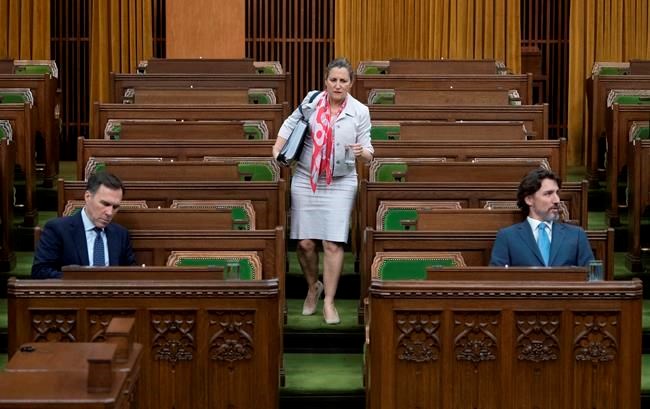OTTAWA — Bright spotlights, metal girders and the stone backdrop of West Block's interior courtyard give the temporary home of the House of Commons the feel of a movie set.
Perfect, some have observed, for the political theatre that usually unfolds on the floor.
On Wednesdays, it's normally a raucous show.
The sitting always follows the weekly meetings of party caucuses and usually all 338 seats are filled with MPs ready to fire on all cylinders at their political foes.
In a pandemic Parliament, business is not as usual, though the hallowed institution is trying.
Around 20 MPs were present Wednesday for the latest COVID-19 era sitting of Parliament, this one called to deal with a bill to help the dairy sector.
They were scattered through the chamber like pieces on a checkerboard, respecting the physical distancing measures now in place countrywide.
Parliament, like much of the country, adjourned back in mid-March as the number of COVID-19 cases in Canada started rising.
On a table inside the House of Commons, a relic of those times: a dusty pile of paper copies of the projected order of business for Thursday, Mar. 12. It was the last full day before the pause. The centrepiece, a debate on an NDP motion concerning pharmacare.
The schedule, a procedural document, gives no hint of the anxious energy that was coursing through the halls power that day as the government — and Canadians — had no real clue of what lay ahead.
It would later become clear government action was needed, and that required new laws. Parliament has now been recalled three other times to pass aid packages creating billions in new spending and new support programs.
The Opposition demanded more. With so much money, and life-and-death decisions being made, they called for — and won — more oversight. They forced the creation of a special House of Commons committee that, among other things, provides an extended period for them to grill the Liberal government about its COVID-19 response.
That committee meets three times a week, virtually on Tuesday and Thursday, and in person, in that interior courtyard, on Wednesday.
So this Wednesday, a twofer: two-plus hours for the special COVID-19 committee, and then into the next sitting of Parliament.
COVID-19 dominates, in rhetoric and reality.
Gone are the pages who fetch water or pass notes between MPs, who must hand over necessary documents to the clerks themselves.
The heckles remain as the leaders face off with each other, but there's no thunderous applause or thumping on the desks after every question or answer.
On Wednesday, Conservative MP Pierre Poilievre, having finished a round of getting under the skin of Liberal Finance Minister Bill Morneau — some things do not change in politics — proffered a box of antibacterial wipes to fellow Tory MP Jag Sahota sitting several seats away.
Only one MP wore a mask: Conservative Scott Reid.
On the opposite side of the aisle, government House leader Pablo Rodriguez gave up what subtlety he's deployed in the past to tap which Liberal will answer a question from the Opposition.
For one, with just a handful actually there, there are fewer choices.
But two — with his caucus mates spread out, a small hand wave might not work. So it was a gentle shout, startling deputy prime minister Chrystia Freeland up from the paperwork she was reading on her desk a few rows over.
Some traditions have been preserved. The 2:30 p.m. eastern time sitting of Parliament began as all sittings do, with the Speaker's parade.
The doors were thrown open with their usual pomp, as the sergeant-at-arms, carrying the mace, led the Speaker and clerks into the House.
But this day, their sharp and precise steps were taken two metres apart from one another, and fewer Commons' officials joined the parade.
Also missing, the political or parliamentary staffers, throngs of media, herds of tourists and lobbyists who often end up squished against the walls as the parade marches by.
The bill before MPs Wednesday would let the Canadian Dairy Commission borrow $200 million more to finance purchases of more of the dairy products stuck on farms as demand for cheese, butter and milk has curdled.
Agriculture Minister Marie-Claude Bibeau rose to speak to the need for the extra funds.
"We absolutely have to be there for our farmers, they are essential our food security and they deserve our full support," she said.
She and the government have received constant criticism for not doing enough, or fast enough, for the agriculture sector.
Conservative agriculture critic John Barlow pointed out that upwards of $2.6 billion has been requested by farmers and ranchers and growers as they struggle with fallout from COVID-19.
Government support is nowhere near that level, he said.
"The farmhouse is burning down and the Liberal government is offering a bottle of water."
In keeping with an expedited process now in place for COVID-19 response, the bill received a single day's debate Wednesday before passing the House of Commons. The Senate will take it up Friday, when it is also expected to be dealt with swiftly.
This report by The Canadian Press was first published on May 13, 2020.
Stephanie Levitz, The Canadian Press



